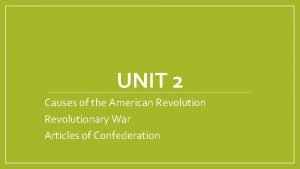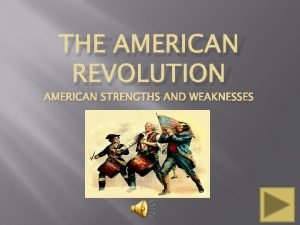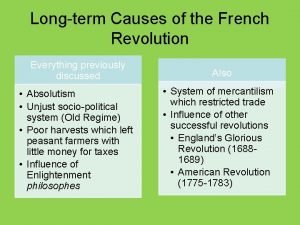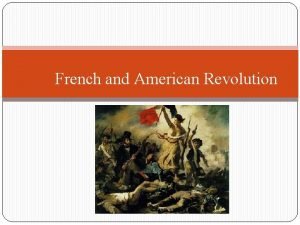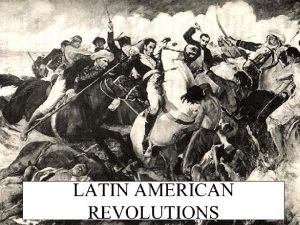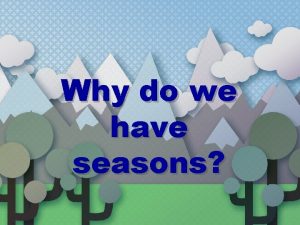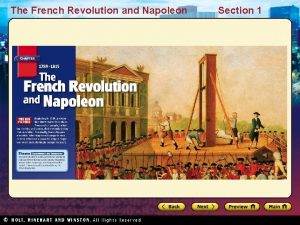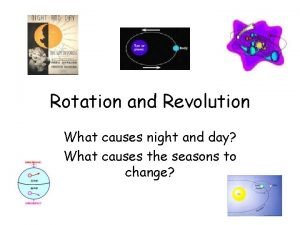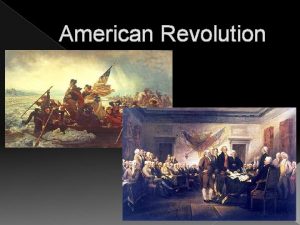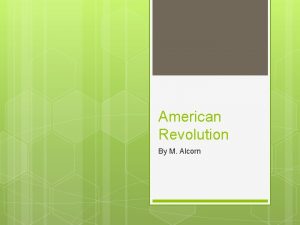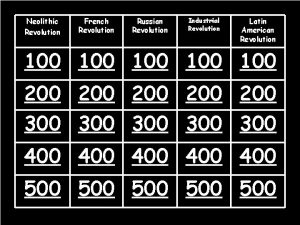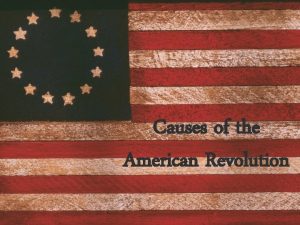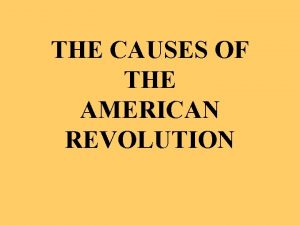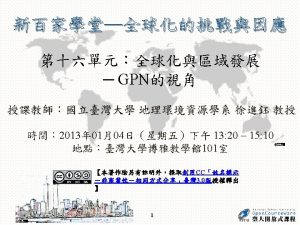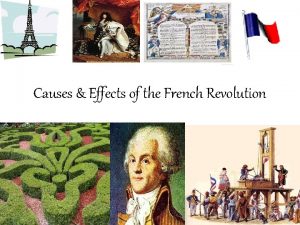THE AMERICAN REVOLUTION 09 The American Revolution Causes






















- Slides: 22

THE AMERICAN REVOLUTION 09 The American Revolution - Causes, Course and Consequences Chapter 09

THE AMERICAN REVOLUTION 09 What Will I Learn? • Examine the causes, course and consequences of the American Revolution • Explore the Nature of History

THE AMERICAN REVOLUTION America in 1750 See Skills Book p. 83 09

THE AMERICAN REVOLUTION Create your own mind map of the Causes of the American Revolution based on the features above. 09

THE AMERICAN REVOLUTION The Navigation Acts • British control of American trade • Some American products, e. g. sugar, cotton and tobacco, could only be sold through England • Americans smuggled their goods • Clashes with British 09 The Seven Years War • British and Americans combined to defeat French in North America • Cost of war increased British national debt • Britain imposed taxes on Americans to pay for cost of the war and for defence of America

THE AMERICAN REVOLUTION Quartering Act • American towns and villages had to provide food and shelter for British troops Sugar Act • A tax on sugar imports 09

THE AMERICAN REVOLUTION The Stamp Act and the Sons of Liberty • Americans had to pay a tax on newspapers and legal documents • Sons of Liberty organised against the Stamp Act • Stamps were burned • Stamp officials attacked • Slogan – ‘No Taxation without Representation’ 09

THE AMERICAN REVOLUTION 09 Source 1 For the English colonies have increased so much in their number of inhabitants, and in their riches, that they almost compete with Old England. Now in order to keep up the authority and trade of their mother country (England), they are forbidden to establish new manufactures … These and some other restrictions (limits) occasion (cause) the inhabitants of the English colonies to grow less tender for their mother country … (Peter Kalm, Swedish biologist in Travels into North America, 1753– 61) How does source 1 help you understand the causes of the American Revolution?

THE AMERICAN REVOLUTION Source 2 The province of Massachusetts Bay has been for some years past, I believe, rather on the decline. Its inhabitants have lost several branches of trade … They have been burdened with heavy taxes. … (Rev Andrew Burnaby, Anglican Minister visiting from England in Travels through the Middle Settlements in North America, 2 nd edition, 1775) How do Sources 2 and 3 help you understand the causes of the American Revolution? 09 Source 3 … That by this constitution, every man in the dominion is a free man: That no parts of his Majesty’s dominion can be taxed without their consent. (James Otis, a lawyer in Massachusetts, in The Rights of the British Colonies Asserted and Proved, [1763])

THE AMERICAN REVOLUTION Boston Massacre 09 The Boston Tea Party, by Nathaniel Currier A drawing of the Boston Massacre How did these events contribute to the Causes of the American Revolution? See Skills Book pp. 84, 86

THE AMERICAN REVOLUTION 09 The Bostonians Paying the Excise-Man, a print published in London How does this print portray those carrying out the tarring and feathering?

THE AMERICAN REVOLUTION The Revolutionary War Begins – Lexington and Concord By the rude bridge that arched the flood, Their flag to April’s breeze unfurled; Here once the embattled farmers stood; And fired the shot heard ‘round the world. (Ralph Waldo Emerson’s Concord Hymn, 1837) 09

THE AMERICAN REVOLUTION Tom Paine and Common Sense Wherefore, what is it that we want? Why is it that we hesitate? From Britain we can expect nothing but ruin. I challenge the warmest advocate (supporter) for reconciliation (peace) to show a single advantage that this Continent can reap (gain) by being connected with Great Britain. But the injuries and disadvantages which we sustain by that connection, are without number … Now! At this very moment must these good and democratic colonies throw off the trammels (restrictions) of a vicious monarchy … What effect would these words have on Americans at the time? 09

THE AMERICAN REVOLUTION The Continental Congress • George Washington appointed commander-in-chief of the Continental (American) Army • Declaration of Independence, 4 July 1776 ‘We hold these truths to be selfevident, that all men are created equal, … with certain unalienable (can’t be taken away) Rights, … among these are Life, Liberty and the pursuit of Happiness. ’ 09

THE AMERICAN REVOLUTION 09 What were the strengths and weaknesses of each side? The British Army • • • Britain had a population of 8 million people 500, 000 American loyalists favoured remaining with Britain had a 50, 000 strong army Britain hired German mercenaries The British navy controlled the seas Britain was 4, 800 km (3, 000 miles) from America British soldiers were inexperienced Mercenaries deserted or did damage British soldiers did not know the countryside The Continental army of the American colonies • • • The Americans were not united America had to build up its army The Continental Army was largely made up of part-time militia The militia were farmers who had to return to work on their farms America did not have a proper navy War disrupted the American economy Americans were fighting for their ‘glorious cause’ The American colonies had a population of about 2. 5 million, including about half a million slaves The Americans used guerrilla tactics by using the cover of the woods to attack and retreat American soldiers had problems of thieving, drunkenness and smallpox George Washington was the commander

THE AMERICAN REVOLUTION 09 What was the turning point in the war? See Skills Book pp. 87, 88

THE AMERICAN REVOLUTION 09 Why is this event important? Washington Crossing the Delaware painted by Emanuel Leutze Investigate the historical accuracy of this painting which was painted about 1850. See Skills Book p. 89

THE AMERICAN REVOLUTION 09 The Battle of Yorktown Why did the British surrender at the Battle of Yorktown?

THE AMERICAN REVOLUTION The Consequences of the American Revolution 09

THE AMERICAN REVOLUTION Create your own mind map on the Consequences of the American Revolution based on the features above 09 See Skills Book p. 90

THE AMERICAN REVOLUTION 09 Which of the arguments in A and B do each of these points (for and against? ) favour?

THE AMERICAN REVOLUTION 09
 Main causes of the american revolution
Main causes of the american revolution American revolution strengths and weaknesses
American revolution strengths and weaknesses American revolution causes and effects
American revolution causes and effects The effects of the french revolution
The effects of the french revolution Causes of the american revolution gallery walk
Causes of the american revolution gallery walk Latin revolution causes
Latin revolution causes Economic causes of french revolution
Economic causes of french revolution Proximate and ultimate causes of behaviour
Proximate and ultimate causes of behaviour Social behavior examples in animals
Social behavior examples in animals Seasons
Seasons Causes and effects of the russian revolution
Causes and effects of the russian revolution Causes and effects of the french revolution
Causes and effects of the french revolution Explain the causes of french revolution
Explain the causes of french revolution Economic causes of the french revolution
Economic causes of the french revolution Short term causes of the french revolution
Short term causes of the french revolution Immediate cause of french revolution
Immediate cause of french revolution French revolution political causes
French revolution political causes French revolution causes
French revolution causes French revolution
French revolution French
French Impacts of the haitian revolution
Impacts of the haitian revolution What causes day and night rotation or revolution
What causes day and night rotation or revolution French revolution causes and effects
French revolution causes and effects
